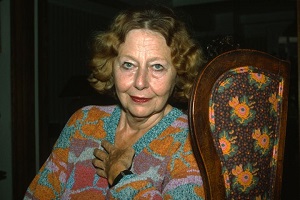De Amerikaanse schrijfster en literatuurcritica Elizabeth Hardwick werd geboren op 27 juli 1916 in Lexington, Kentucky, in een strikt protestantse familie. Ze studeerde af aan de Universiteit van Kentucky in 1939. In 1947 verwierf zij een Guggenheim Fellowship. In 1959 publiceerde Hardwick in Harper’s, “The Decline of Book Reviewing”, een over het algemeen harde en zelfs vernietigende kritiek op boekrecensies die in Amerikaanse tijdschriften van die tijd werden gepubliceerd. De krantenstaking uit 1962 in New York City heeft Hardwick, Robert Lowell, Jason Epstein, Barbara Epstein en Robert B. Silvers geïnspireerd om “The New York Review of Books” op te richten, een publicatie die voor veel lezers net zo gewoon werd als The New York Times Book Review die Hardwick in haar essay in 1959 aan flarden had gescheurd. In de jaren zeventig en het begin van de jaren tachtig gaf Hardwick lezingen aan het Barnard College en aan Columbia University’s School of the Arts, Writing Division. Zij leverde openhartig kritiek op het schrijven van de studenten, maar was een mentor voor studenten die zij als veelbelovend beschouwde. Van 1949 tot 1972 was zij getrouwd met de dichter Robert Lowell, met wie zij een dochter kreeg. Zij werd gekozen tot Fellow van de Amerikaanse Academie van Kunsten en Wetenschappen in 1996. In 2008 selecteerde The Library of America het verhaal van Hardwick over de misdaden van Caryl Chessman voor opname in een retrospectief over twee eeuwen schrijven over American True Crime. Hardwick schreef drie romans: “The Ghostly Lover” (1945), “The Simple Truth” (1955) en “Sleepless Nights” (1979). Een bundel met korte verhalen, “The New York Stories van Elizabeth Hardwick”, werd in 2010 gepubliceerd. Ze publiceerde ook vier boeken met kritieken: “A View of My Own” (1962), “Seduction and Betrayal” (1974), “Bartleby in Manhattan” (1983) en “Sight-Readings” (1998). In 1961 stelde zij “The Selected Letters of William James” samen en in 2000 publiceerde ze een korte biografie, “Herman Melville”, in de Penguin Lives-serie van Viking Press
Uit: Seduction and Beayal
“For his own part the Reverend Brontë disowned claims to flamboyance and said: “I do not deny that I am somewhat eccentric…. Only don’t set me on in my fury to burning hearthrugs, sawing the backs off chairs and tearing my wife’s silk gowns.” There were five daughters and one son in the Bronte fam-ily, and the father unluckily placed his hopes in his son, Branwell. It is only by accident that we know about people like Branwell who seemed destined for the arts, unable to work at anything else, and yet have not the talent, the tenac-ity, or the discipline to make any kind of sustained creative effort. With great hopes and at bitter financial sacrifice, Bran-well was sent up to London to study painting at the Academy Schools. The experience was wretched for him and he seemed to have sensed his lack of preparation, his uncertain dedi-cation, his faltering will. He never went to the school, did not present his letters of introduction, and spent his money in taverns drinking gin. It finally became necessary to return home in humiliation and to pretend that he had been robbed. One story has poor Branwell visiting the National Gallery and, in the presence of the great paintings there, despairing of his own talents. This is hard to credit, since the example of the great is seldom a deterrent to the mediocre. In any case, nothing leads us to think Branwell lacked vanity or expansive ideas of his own importance. Also, the deterrent of Branwell’s own nature made any further impediments unnecessary. His nature was hysterical, addictive, self-indulgent. Very early he fell under the spell of alcohol and opium; his ravings and mis-eries destroyed the family peace, absorbed their energies, and depressed their spirits. He had to be talked to, watched over, soothed, and protected—and nothing really availed. Branwell destroyed his life with drugs and drink, and died of a bronchial infection at the age of thirty-one. Perhaps the true legacy Branwell left the world is to be found in the extraordinary violence of feeling, the elaborate language of bitterness and frustration in Wuthering Heights. It is not unreasonable to see the origin of some of Heathcliff’s raging disappointment and disgust in Branwell’s own excited sense of injury and betrayal. Emily Brontë took toward her brother an attitude of stoical pity and protectiveness. Char-lotte was, on the other hand, in despair at his deterioration, troubled by his weaknesses, and condemning of the pain he brought to the household. It is significant that Charlotte insisted Branwell did not know of the publication of his sisters’ poems, nor of the composition of Wuthering Heights, Jane Eyre, and Agnes Grey.”

Elizabeth Hardwick (27 juli 1916 – 2 december 2007)
